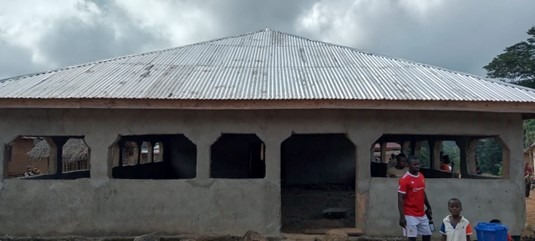The U.S. government is currently spearheading a significant initiative in Nimba County, Liberia, aimed at empowering rural women through the construction of a modern market. With over 3,440 women vendors in Zor Gabarplay directly benefiting from this project, the market is designed to meet their specific needs by providing a safe and organized space for them to sell their goods, expand their businesses, and connect with customers. This endeavor highlights the U.S. commitment to improving infrastructure in rural Liberia, addressing the challenges these rural women face and enhancing their financial independence. The planned market space is expected to substantially uplift the women’s household incomes and strengthen the local economy, thus creating a ripple effect in the community.
During a recent assessment visit, project implementer Buutay K. Buu and his team were warmly welcomed by the rural market women. Traditional celebrations greeted their arrival, showcasing the community’s appreciation for the U.S. government’s assistance. With a robust track record in supporting rural development through education, environmental initiatives, and poverty alleviation, Mr. Buu sees the market not just as a physical structure but as a beacon of hope and opportunity for the women and families of Zor Gbarplay. He emphasized that the market will play a vital role in ensuring the dignity and economic empowerment of the women involved, thus paving the way for a more prosperous future.
In his remarks, Mr. Buu expressed gratitude toward the U.S. government, specifically acknowledging Ambassador Mark Toner’s efforts to promote grassroots development in Liberia. He noted that sustainable projects like the market construction are instrumental in fostering opportunities for underserved communities. Mr. Buu’s vision extends beyond mere construction; he perceives the market as crucial for the economic development of Zor Gbarplay, equipping the beneficiaries with tools to contribute meaningfully to their community while improving their livelihoods. Furthermore, he reiterated the importance of collaboration among communities and partners to foster sustainable change that will address both local and global challenges.
The rural marketers echoed Mr. Buu’s sentiments through Chairperson Madam Ruth Dopoh, who conveyed their heartfelt appreciation to the U.S. government. She acknowledged the challenges faced by women engaged in local and cross-border trade, particularly the lack of market structures that provide adequate shelter and safety for their trading activities. Madam Dopoh highlighted that these women have often had to risk exposure to the elements while trying to earn a living. She expressed deep gratitude for the government’s intervention, which will alleviate these difficulties and create a more conducive working environment for the rural traders.
However, numerous challenges persist even with the market construction project. Madam Dopoh pointed out that many women lack the necessary training in business management, vocational skills, and funding, which inhibits their potential for growth and independence. She urged the U.S. government to consider additional support in these areas, emphasizing the need for vocational training programs and business management education. With the right skills and financial support, she believes that the women can transform their current local trades into sustainable businesses, asserting their self-reliance and independence.
Mr. Buu’s project signifies more than just an immediate response to infrastructural needs; it embodies a larger vision to create lasting change within the community. By addressing both the physical construction of the market and the accompanying challenges faced by these women, the initiative stands as a promise of empowerment and economic advancement. This multi-faceted approach reflects a commitment to not only uplifting the women of Zor Gbarplay but also fostering an environment where they can thrive as active contributors to their community and economy. With continued support and collaboration from partners like the U.S. government, the prospects for rural women in Liberia appear increasingly optimistic, setting the stage for a brighter and more prosperous future.














